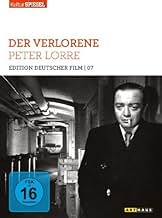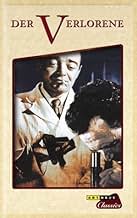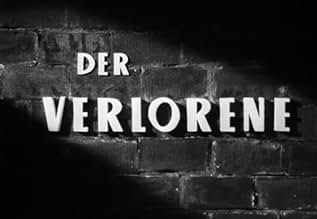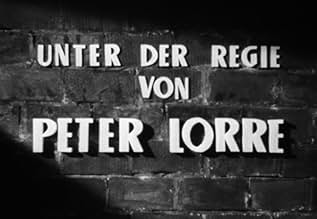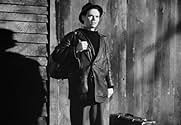Der Verlorene
- 1951
- 1 Std. 38 Min.
IMDb-BEWERTUNG
7,0/10
1232
IHRE BEWERTUNG
Füge eine Handlung in deiner Sprache hinzuGerman scientist murders his fiancée during World War II when he learns that she has been selling the results of his secret research to the enemy.German scientist murders his fiancée during World War II when he learns that she has been selling the results of his secret research to the enemy.German scientist murders his fiancée during World War II when he learns that she has been selling the results of his secret research to the enemy.
- Auszeichnungen
- 1 Gewinn & 1 Nominierung insgesamt
Helmuth Rudolph
- Colonel Winkler
- (as Helmut Rudolph)
Eva Ingeborg Scholz
- Ursula Weber
- (as Eva-Ingeborg Scholz)
Peter Ahrweiler
- Oberstleutnant Marquardt
- (Nicht genannt)
Josef Dahmen
- Lieske, canteen bartender
- (Nicht genannt)
Helmut Eichberg
- Oberstleutnant Bydersahn
- (Nicht genannt)
Kurt Fuß
- Baldheaded Man
- (Nicht genannt)
Joachim Hess
- Leutnant
- (Nicht genannt)
Richard Münch
- Criminal Inspector #1
- (Nicht genannt)
Empfohlene Bewertungen
10vferenz
Der Verlorene is an extraordinary film noir not only as text but also in its context. This film disappeared after only ten days from german screens although most critics said that it´s the best german film after WW II. The reasons are very simple: First, it was too late. This film five years earlier in 1946 would have been the Trümmerfilm par excellance. Compare it to Die Mörder sind unter uns and you will see the huge difference. Second, in the upcoming era of Wirtschaftswunder no one in whole Western Germany wanted a reminder on what their industry and morality was build on: the Third Reich. Consider this, when Marlene Dietrich came back to Germany many people shouted: Go home! In the 1950s one producer said about Fritz Kortner: Hitler could have burnt more Jews. This way of thinking wasn´t elimated and still it´s not. Nowadays WW II is good for action flics (Saving Private Ryan and all this crap) or love stories (for example this desaster Enemy at the Gates). It´s depressing but one shouldn´t get mad over it. Just see Der Verlorene and you will see there were people how to handle this topic in an adequate manner. Maybe there are some filmmakers out there who still know. Let´s hope for it.
So heavy and so depressing, as any post-World War II German film - with flashbacks - would be.
Peter Lorre, in real life addicted to morphine, came out of rehab and returned to Germany, where he directed and starred in a film, The Lost Man, in 1951.
Lorre is a scientist, Dr. Karl Rothe, who after the war was presumed dead and therefore was able to change his name to Neumeister. During the Nazi era, he learns from those over him that his discoveries are being sold to the enemy - by his fiancee.
In a rage, he strangles her. Now he works as a doctor in a refugee camp, but is reminded of his past in the presence of the man who was his assistant during the war, Hosch, who was involved in the investigation of The Night of the Long Knives.
The "Night Of The Long Knives" was a series of political extrajudicial executions intended to consolidate Hitler's power and alleviate the concerns of the German military about the role of Ernst Röhm and the Sturmabteilung (SA), the Nazis' paramilitary organization, known colloquially as "Brownshirts."conspiracy.
That Neumeister has become completely unstable is demonstrated not only in his narration of the flashback, in which he tells Hosch that he intended to kill him, but in his problems with women. At one point, he murders a woman while on a train.
Lorre did a magnificent job in both his acting and direction. The end of the film is just as miserable as the rest of it. It's powerful, but don't have any sharp objects in the house.
Peter Lorre, in real life addicted to morphine, came out of rehab and returned to Germany, where he directed and starred in a film, The Lost Man, in 1951.
Lorre is a scientist, Dr. Karl Rothe, who after the war was presumed dead and therefore was able to change his name to Neumeister. During the Nazi era, he learns from those over him that his discoveries are being sold to the enemy - by his fiancee.
In a rage, he strangles her. Now he works as a doctor in a refugee camp, but is reminded of his past in the presence of the man who was his assistant during the war, Hosch, who was involved in the investigation of The Night of the Long Knives.
The "Night Of The Long Knives" was a series of political extrajudicial executions intended to consolidate Hitler's power and alleviate the concerns of the German military about the role of Ernst Röhm and the Sturmabteilung (SA), the Nazis' paramilitary organization, known colloquially as "Brownshirts."conspiracy.
That Neumeister has become completely unstable is demonstrated not only in his narration of the flashback, in which he tells Hosch that he intended to kill him, but in his problems with women. At one point, he murders a woman while on a train.
Lorre did a magnificent job in both his acting and direction. The end of the film is just as miserable as the rest of it. It's powerful, but don't have any sharp objects in the house.
Somehow Peter Lorre wanted to make a comeback in post war Germany with this movie. He plays the principal role in Der Verlorene, a little guy stumbling through the Nazi years in Germany and ending up just wanting to put an end to his life (apparently based on a true story). He also directed and participated in the screen writing. And that was probably too much. The movie is ill paced and takes several unexpected turns which break down the narrative rhythm. The movie also seems to shift in an uneasy way into different genres. It starts out as a solid firm noir with a flashback, a love story, betrayal and a murder. Then Lorre reverts to his role in Fritz Lang's M and becomes a psychotic woman hater and mass murderer. Then, back in the noir mode, he stumbles inadvertently into the preparation for the assassination of Hitler (a real event that took place in 1944) and, believe it or not, the movie definitely becomes a kind of a black comedy. The main character ends up a tragic clown who can not be taken seriously (and I am pretty sure it was not meant that way). Some plot details are plainly ludicrous and do not work. An example: Lorre's character takes to strangling women who try to "make him hot". They are decidedly bigger and larger than he is and all look as if they would put up fierce resistance against a strangling Lorre, probably easily overpowering him. But they react like frightened lambs I just had to laugh at that, or was I missing a crucial symbolic twist here? However, other aspects of the movie are interesting. The theme of betrayal and double cross are cleverly presented as the essence of every day life in Nazi Germany. The set design and the scenes shot on location somewhere in Germany create an oppressive atmosphere with darkened parlours, basement laboratories, bleak apartments and landscapes of ruins and emergency shelters. Actually, all the elements that make a good movie are there and in itself well presented: some good dialogue, the observation, the surprise moments, the suspense and even a car chase. There are some very good female parts. The game of flirting and sexual innuendo is presented in a frankness that was pretty drastic for the period, I guess. But these elements stand by themselves and unfortunately don't come together to form a good movie. Robert Siodmak's thematically related movie Nachts, wenn der Teufel kam was a much more convincing comeback with a film that transports American noir mode to Nazi Germany.
After eighteen years in exile Peter Lorre returned to the land of his birth for his one and only stab at directing. Based upon a newspaper article about a doctor who had killed his assistant and then stepped in front of a train, Lorre has fashioned a screenplay with the help of novelist Benno Vigny and esteemed director Helmut Kautner.
Like so many actors who take up directing he is very generous to his players and in particular allows his five actresses to shine. Individual scenes are extremely effective but these alas are achieved at the expense of overall structure. Despite oodles of atmosphere from superlative lighting cameraman Vaclav Vich, the film is weakened by a verbose script and an intrusive, over-orchestrated score. Suffice to say Lorre is riveting as Dr. Rothe but the entire enterprise required a firmer hand at the helm.
This is a film that Lorre evidently felt compelled to make but this bleak allegory of Germany's fatal flirtation with National Socialism and the nation's collective guilt in the person of a serial murderer was hardly likey to be welcomed by audiences of the time and such proved to be case.
That it has a haunting quality is undeniable and remains, in the words of David Thomson, "a direct imprint of a very troubled soul."
Like so many actors who take up directing he is very generous to his players and in particular allows his five actresses to shine. Individual scenes are extremely effective but these alas are achieved at the expense of overall structure. Despite oodles of atmosphere from superlative lighting cameraman Vaclav Vich, the film is weakened by a verbose script and an intrusive, over-orchestrated score. Suffice to say Lorre is riveting as Dr. Rothe but the entire enterprise required a firmer hand at the helm.
This is a film that Lorre evidently felt compelled to make but this bleak allegory of Germany's fatal flirtation with National Socialism and the nation's collective guilt in the person of a serial murderer was hardly likey to be welcomed by audiences of the time and such proved to be case.
That it has a haunting quality is undeniable and remains, in the words of David Thomson, "a direct imprint of a very troubled soul."
DER VERLORENE is one of these films that at first seemed to me very confusing and brought me the sensation "i am not following...".I rated it 8 out of 10 mainly because of the wonderful film-noir atmosphere,the black and white photograph,the very well filmed scenes on the streets of "old" Hamburg and ,above all,the extraordinary last minutes.
Then,time passed and months later ,i still have that strange feeling in my mind ,i have been dreaming with that loneness and absurd madness of the main character-the doctor played by Peter Lorre.So i decided to include DER VERLORENE amongst my personal list of best films ever and change my vote to 10 out of 10.
Sometimes a good work of art takes its necessary time to mature as a good wine!.In my humble opinion that is the case of this film.
Then,time passed and months later ,i still have that strange feeling in my mind ,i have been dreaming with that loneness and absurd madness of the main character-the doctor played by Peter Lorre.So i decided to include DER VERLORENE amongst my personal list of best films ever and change my vote to 10 out of 10.
Sometimes a good work of art takes its necessary time to mature as a good wine!.In my humble opinion that is the case of this film.
Wusstest du schon
- WissenswertesPeter Lorre's only film as director
- Crazy CreditsExplanatory caption (in German) in opening credits: This film is not a work of fiction. The events are based on factual reports from the last few years.
- Alternative VersionenThere is an Italian edition of this film on DVD, distributed by DNA srl, "UN UOMO PERDUTO (1951) + CRIME AND PUNISHMENT (Ho ucciso!, 1935)" (2 Films on a single DVD), re-edited with the contribution of film historian Riccardo Cusin. This version is also available for streaming on some platforms.
- VerbindungenFeatured in Displaced Person - Peter Lorre und sein Film 'Der Verlorene' (2007)
Top-Auswahl
Melde dich zum Bewerten an und greife auf die Watchlist für personalisierte Empfehlungen zu.
Details
- Laufzeit
- 1 Std. 38 Min.(98 min)
- Farbe
- Sound-Mix
- Seitenverhältnis
- 1.37 : 1
Zu dieser Seite beitragen
Bearbeitung vorschlagen oder fehlenden Inhalt hinzufügen

